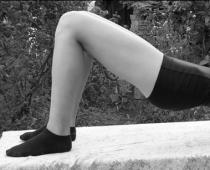Probably many in this computer-telephone age suffer from poor eyesight, televisions, computers, telephones, without them we cannot imagine our current life. Yes, I don’t argue with someone who, at 60, will see how at 20, but unfortunately not everyone is so lucky, so I would like to tell you about laser vision correction.
I read dozens of articles from people who made the correction, there is even one friend who went through it, all as one assert that it was worth it. And now for more details on how laser vision correction occurs. You pass into the preoperative room, you are sterilized and dressed. On average, the operation lasts 10-15 minutes. You are placed in a special chair, your legs are lifted upwards by 40 degrees so that blood rushes to your head. The doctor is usually very polite and tries to calm you down. Depending on the type of laser correction, anesthesia can be used, but there are different technologies in principle for ordinary people, they differ only in valuable and rehabilitation time after surgery.
After they put you in a chair, they put such dilators on your eyes so that your eyes would not close during the operation. you look at the green or red dot for a few seconds so that the Japanese orbital eye apparatus takes the measure of your eye. Next, a special piece is applied to your eye, which first creates a vacuum, as if a powerful vacuum cleaner stuck to your eye, everything turns black, absolute darkness in the eye, you have never seen such darkness. Then the device cuts the upper flap of your eye by 90% and the doctor gently opens this flap. Simply put, in humans, the average corneal thickness is 500-600 micrometers. And the task of the laser is to burn out about 150 micrometers of different areas that make it difficult to see well. The doctor says look at the red dot, try not to pull your eyes. And the laser starts its work, burns your eyes with pulses. And this is the most terrible moment in the operation, there is a smell of burning and guess what is burning? right this is your eye! They lightened for 10-15 seconds and everything, covered up the special flap of the cornea with a special liquid, poured it over the liquid and put the flap back on it, it would heal, they do the same with the other eye.
You ask if it hurts? No, it is absolutely not painful, you do not feel nothing, only the pressure from the device for fixing the eyelids, but the feeling is extremely not pleasant when you burn your eyes with a laser. After the operation, you enter a dark room and sit there for 2 hours with the rest of the patients. And then you go home to drink tea))
In the first week after the operation, it will be almost impossible to look at the light, sit at the computer or just read a book.
As for the price, it varies greatly depending on the city and methodology. On average, it does not exceed 40 thousand in both eyes. It may be expensive, but you have never done so
profitable investment.
Six months ago, I decided and did a laser vision correction. I want to tell why it was done, what the alternatives were, and what is happening with my eyes now. Perhaps someone this experience may be useful.
For those who for some reason do not know.
Laser correction This is a photochemical ablation of the corneal layers under the influence of an excimer laser beam, resulting in a change in the curvature of the outer surface of the cornea and, as a result, its refraction, which leads to the focusing of light rays on the retina, that is, the return of good vision.
Wikipedia
In simple words: you, with the help of a laser, will change the curvature of the cornea and, due to this, the vision will be good. I have experienced laser keratomile sores (LASIK) - a modern high-tech method of laser vision correction, which is considered to be the most safe and accurate.
Many people with poor eyesight think about laser correction. But not everyone does. For some, there is an insurmountable obstacle - medical contraindications. Others are simply afraid. Someone easier to go with lenses and glasses. There is a unique category of people to whom a separate bow is, those who correct their vision with the help of special exercises (if you are in this category and have made some progress, be sure to get in touch through comments, your experience is interesting).
I was scared too, but from the most good lenses my eyes hurt, I wore them only for some significant events, and it was a one-time decision. Glasses are pretty much fed up since childhood + in winter, they are completely uncomfortable. Someone will add to this that a one-time fee for correction (I got about 30,000 for both eyes) is more economical than regular buying lenses or buying glasses (less often than lenses, of course, but expensive), especially if you since childhood.
Vision at the time of the operation: -3, -3.5 (for understanding, this is not very bad vision, but the numbers of minibuses are bad, so that you will not have time to give up). However, I was not particularly compared with anything. This later I learned how the world looks in detail.
While I wore glasses only situationally, my vision practically did not fall. After the glasses finally settled on my nose, my vision began to deteriorate, and with glasses it became visible just as before it was without them. Ophthalmologists, to whom I turned, called for just a constant vision correction. I didn’t like the prospect of changing glasses every six months or a year, gradually increasing the strength of the lenses and seeing how my eyesight gradually deteriorated. And I finally confirmed the desire to have an operation.
A huge plus, in favor of the choice of laser vision correction, was the lack of hospitalization and the ability to quickly return to work.
Of course, there were fears.
Fears and questions:
- Will my vision fall soon after surgery?
- Were there any unsuccessful cases that led to blindness or serious damage to the eye and am I among those unfortunates?
- What if I have low healing and will have defects on my eye or will an infection get there?
- How not to miss with the choice of the clinic?
Answers that I received:
If you work a lot or just sit at a computer for a long time, then you are at risk.
While maintaining a passive-sedentary lifestyle, vision will slowly begin to fall. The fact is that if you constantly sit at the monitor, then your eyes are overstrained. At some point, this overstressing can be removed by eye drops. But if you leave everything as it is, then at a certain point you cannot get enough of drops, myopia will begin to develop again.
From the very beginning, the doctor warned me about the need to perform elementary exercises for vision. In this case, it was necessary to focus on the exercise with the transfer of focus from the tip of the nose to a distant object and back. This exercise allows you to keep your eyes in good shape and avoid the destructive overvoltage that occurs during prolonged continuous focusing on a close object (for example, on a laptop that stands before you).
On issues 2 and 3, I didn’t get anything terrible and in the end everything worked out. The bruises after the operation were, of course, but successfully healed, and now the eyes look normal.
The choice of the clinic took place solely on the basis of feedback from people whom I personally know and who have already done similar operations in our city.
How was the operation?
First, I underwent a medical examination in an eye clinic and the doctor told me about the operation, then I passed all the necessary tests. After that, I received confirmation that the operation can be done.
On the day of the operation, they gave me an anesthetic, anesthetic was dropped into my eyes, and after a small amount of time I was asked to lie down on the operating table. A speculum was inserted into the eye in order to eliminate spontaneous blinking (at this stage, the main thing is to relax and not resist, then it will not be painful). Then I was asked to look at the red and green lights of the installation. Then, by eye (alternately), a vacuum ring was lowered, which “pressed” until completely darkened, then a few seconds of unpleasant sensations, while the flap was cut and pushed back. This is the only place during the operation where the patient may experience discomfort within a few seconds or may not. Then there is a direct correction with a laser, after which the flap is returned into place and taken to the second eye. The whole operation takes no more than 10-15 minutes.
At the time of rehabilitation after surgery, they give official sick leave (although you can return to work on the 2nd day after surgery). It makes sense for the hospital to take those whose work is connected with a long stay in front of the monitor screen (in order to avoid eye strain) and those who cannot bury in the eyes 6 times a day while at work. Since my work is directly related to a long stay in front of the computer, I took advantage of the hospital.
After the operation, the doctor conducts regular eye examinations and monitors their condition.
Feelings after
After the operation, I experienced a slight sensation of euphoria and a desire to consider literally everything. The world has opened up to me in detail. In addition, living with 100% vision has made me much more comfortable and safer.
About half a year has passed since the operation. Vision does not fall. But what happened was what the doctor warned me about: at the first stage I didn’t do the exercises at all and sat more than 10 hours a day at the computer with minimal interruptions. As a result, the eyes spasmed and had a month to drop special drops. Now the situation has returned to normal, I try to do at least once a day exercises for the eyes and short breaks in work.
Dear readers, we are interested in your experience. Share in comments how laser vision correction changed your life, did you have 100% vision after it?
P.S .: You may find the information useful that laser vision correction refers to operations for which you can receive a tax deduction of 13% of the amount spent. Keep your checks!
Date: 01/28/2016
Comments: 0
Comments: 0
- Additional laser techniques used in vision correction
Laser vision correction is one of the most effective and popular methods of vision correction. Using this method is as safe as possible for a patient who needs to make adjustments in the work of the visual apparatus. Laser vision correction is used to correct any kind of irregularity.
Thanks to the technology and quality of the laser equipment, the accuracy of the intervention is achieved, which gives a chance to return the sight to a large number of people suffering from visual impairment. Laser correction is carried out as indicated, when a significant difference in visual acuity between the eyes of a person is detected, and at the request of the patient himself. However, in the latter case, intervention is carried out only if there are no contraindications.
Contraindications when using methods of laser vision correction
Despite the wide possibilities that are inherent in laser vision correction, there are certain contraindications for its performance. The main limitations in which laser correction is dangerous are the following:

The most common methods of laser vision correction today are the methods of photoreactive keratectomy and laser keratomileusis.
Back to table of contents
Photorefractive keratectomy method
The first attempt to use an excimer laser in medicine for the treatment of diseases of the organs of vision was made in 1985. The technology itself using an excimer laser is a contactless effect of a laser light beam on the surface of the cornea. This type of exposure does not affect the inner layers of the cornea and the structure of the eyeball.
When using the PRK method, microdistortion is carried out on the outer layer of the cornea. When using this method of treatment, the healing of the surface layer tissues takes a long time. After surgery, the patient for a long time should use eye drops. Treatment using this method can not be carried out simultaneously in both eyes.
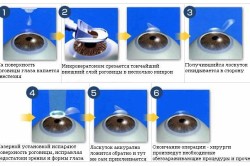 There are certain physiological boundaries when applying the method of photorefractive keratectomy. The main parameters of these physiognomic boundaries are the following:
There are certain physiological boundaries when applying the method of photorefractive keratectomy. The main parameters of these physiognomic boundaries are the following:
- myopia should be between -1.0 and -6.0 diopters;
- farsightedness can be up to +3.0 diopters;
- astigmatism should not exceed indications from -0.5 to -3.0 diopters.
Surgical intervention according to the PRK method is performed under the influence of local anesthesia. As anesthesia, when doing laser vision correction, use special painkillers eye drops.
During the operation, the patient does not feel pain, and the healing of the surgical field occurs within 1-3 days. During this period, there is a complete restoration of the layers of the cornea of the eye, which was subjected to surgery. In the first postoperative period, the patient may experience quite strong discomfort, which is expressed in tearing and feeling pain and pain in the eye, and a feeling of photophobia may also appear.
Immediately after the laser vision correction, it is recommended that the patient be in a room with dimmed light for the first few days; in addition, symptomatic treatment should be carried out and the rules of septic and antiseptic procedures should be strictly observed, since the surface is a microerosion. The doctor recommends the patient to use eye drops that facilitate healing for one month.
The advantages of the method are:
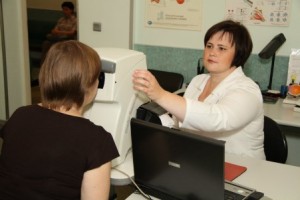
- painless operation;
- no direct contact with the tissues of the eyeball is required;
- short time of surgical intervention;
- the highest accuracy of the operation;
- ability to predict the outcome of the intervention.
As with any surgical procedure, various complications and consequences may occur after PRK. However, when all medical requirements are met, the likelihood of complications is minimal. One of the consequences of the PRK laser correction may be the appearance of light reflections at a light source at dusk or darkness.
Back to table of contents
Laser keratomiles method, LASIK method
The technique of laser keratomileses is a more advanced method compared to PRK, which is a more effective and safe technology of surgical intervention, which provides ample opportunities in the treatment of disorders of the visual apparatus. You can make a vision correction using the LASIK method even if there is myopia in the range of up to - 15 diopters. The factor that is able to limit the application of the method is the thickness of the cornea. With myopia more than -15 diopters, the cornea is very thin, which can lead to complications when using this correction method.
In patients who are recommended to undergo surgery, the question arises of how laser correction is performed using the LASIK technique. LASIK laser vision correction is a modern method at the intersection of technologies using laser and eye microsurgery techniques. The beam of a special laser during the operation carries out the evaporation of the inner layers of the cornea to a predetermined depth. Access to the deeper layers is opened by separating the superficial corneal flap using a microkeratome. After completion of the laser, the corneal flap returns to the site.
 Laser vision correction has a large number of advantages, the main of which are the following:
Laser vision correction has a large number of advantages, the main of which are the following:
- the accuracy of the operation while maintaining a gentle regime;
- small recovery period after surgery;
- painless intervention;
- the possibility of intervention in both eyes at the same time.
Discomfort after surgery may occur within a few hours, and eye drops are used for 10 days. Complications that occur after surgery, are mainly due to the mistakes of the doctor.
Hello, dear friends!
Already what month have I been in doubt - is it worth doing laser vision correction?
At the moment I continue to breastfeed my daughter, so for now the operation is contraindicated for me. Therefore, I took advantage of this situation and closely engaged in a comprehensive study of this issue.
In contact with
I have already studied the technology of laser correction, its types, indications and contraindications. With reviews of people who have done this operation, read. But doubts remained.
Now I decided to find out the opinions of experts about the advisability of carrying out a vision correction. If you're interested too, read on.
What does the main ophthalmologist of Petersburg say about laser vision correction?
About the pros and cons of contact lenses, the dangers of laser correction and why doctors themselves prefer glasses, says chief ophthalmologist of St. Petersburg, MD, Professor Yuri Astakhov.
- Yuri Sergeyevich, now myopia can be corrected in just a couple of minutes with the help of laser vision correction. However, any operation is still a risk. In some cases, vision correction is worth doing, and when should it be avoided?
- Patients often come to me with one question: “Can I do a laser correction?” I answer: “It is possible, but is it necessary?”
There are clear medical indications for laser vision correction.
Let's say the difference in the refractions of the two eyes. For example, on one eye there is little myopia, and on the second it is big.
Glasses here will not help, because people do not tolerate the difference in glasses more than 2-2.5 diopters.
It happens that a person needs good vision without glasses due to the peculiarities of his work. Military, sportsmen, stars can face it.
But most people who come to us are ready to do the surgery simply for cosmetic reasons. Petersburgers come to me with a little short-sightedness of two or three diopters. They say: "Make us an operation, because we do not want to wear glasses or mess with contact lenses."
But after all, any operation, including laser vision correction, is still a risk. There may be complications. Patients need to tell about it, to warn them.
It is impossible for a laser vision correction to be performed by a physician who is driven, to a large extent, by commercial interests. The state bought us all the necessary expensive equipment. And we have no need, as they say now, to beat off the cost of the laser.
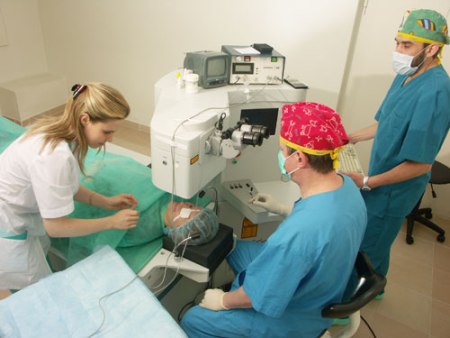 Therefore, we frankly explain the possible consequences of the operation. To give permission for laser correction, the doctor must be sure that the patient’s myopia has not progressed in the past two years. Otherwise, some time after the operation, the vision may drop again.
Therefore, we frankly explain the possible consequences of the operation. To give permission for laser correction, the doctor must be sure that the patient’s myopia has not progressed in the past two years. Otherwise, some time after the operation, the vision may drop again.
Women should remember that myopia is able to progress during pregnancy. The fact is that during this period of life, the properties of the connective tissue change, and the eye may slightly stretch along the axis. So, if there is a possibility, it is better to make a correction after delivery.
Besides, the possibility of the operation depends on the anatomical features of the eye. For example, you cannot make a correction with a very thin cornea. Indeed, during the operation, the uppermost part of the cornea is cut off and folded back to the side like shreds. Then evaporation of a part of the cornea is done, after which this shred is placed in place.
I was told a case when the patient rubbed his eyes after the operation. And the shreds from the cornea turned into a tube ...
In this regard, we can recall the words of the eye microsurgeon Svyatoslav Fyodorov: irresponsible attitude of the patient to their health is a contraindication to the operation. And this is absolutely correct.
“Even after laser correction, your vision may deteriorate again.” Is it allowed in this case to perform the operation again?
- It is not excluded. But here it is important to remember that too much thinning of the cornea is also impossible. In this case, it can take a cone-shaped shape, stump out under the influence of intraocular pressure. And there are already very serious problems. For the same reason, do not make vision correction for people with a high degree of myopia.
- If the operation was successful, can there be any complications in 20-30 years?
- It is unlikely if the laser correction is done correctly, and the patient subsequently monitors their health. Some problems arose only among those who underwent keratotomy using the Fedorov method. By the way, they are no longer being carried out.
And all because this operation is associated with an incision in the cornea. This dramatically reduces its strength. Even with minimal injuries, say, when hitting the ball, people had numerous cases of rupture of the cornea.
- But if laser correction is safe, why do many doctors themselves go with glasses?
- Probably because ophthalmologists, by virtue of their profession, work with various optical magnifying devices. And because the issue of impaired vision is solved very simply: just enough to properly adjust the equipment.
- Suppose a person refused to laser correction. And before him is a choice - glasses or lenses. What is safer?
- Contact lenses are a very good means of vision correction. But they need to be constantly processed, they need to be changed in time. If a person is not ready for this, then it is better to choose glasses. By the way, I would not advise buying lenses in online stores, and glasses - in the kiosks.
- If the lenses are safe, then why do doctors require them to be removed 3-4 months before laser vision correction?
- Lenses do have an effect on the eyes. On the one hand, they slightly deform the cornea. Nothing wrong. But before the operation, this may lead to the doctor not correctly determining the parameters of the cornea.
On the other hand, improperly selected lenses can interfere with the nutrition of the cornea and impede the penetration of oxygen into it. Then it can badly affect the healing process after the operation.
Source http://doctorpiter.ru/articles/5087/
Should I do a laser vision correction?
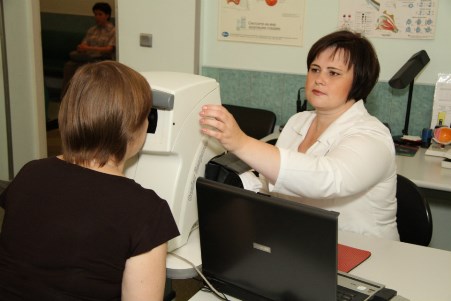
The eyes are often called the mirror of the soul. But it so happens that this very mirror is hidden with glasses or contact lenses, and all attempts to return the precious vision turn out to be fruitless.
In this case, laser correction can come to the rescue - the most effective, safe and reliable way to restore vision, recognized as the leading ophthalmologists of the world. So is it worth doing a laser vision correction - let's find out?
Laser vision correction has already "exchanged" the fifth dozen. Worldwide, over the past 10 years alone, more than 5 million such operations have been carried out. The technology of the method has become so perfect that it allows people from 18 to 55 years old to return sight in a matter of minutes.
Do not even need to ask a question: “What will happen to me if in the midst of the operation the eye blinks and the hand reaches out to fix the hair? Is it possible that my face will have “laser marks” and the eye will not see anything else? ”
Everything is simple - the latest generation of excimer lasers is so perfect that with the slightest deviation a special system stops the correction process, and the operation continues only after the eye position is level.
The main advantages of the procedure are painlessness and lack of hospitalization! Only a few days will be needed in order to return to his usual way of life! And no more eyeglasses on the nose, no lenses!
Excellent laser correction result depends on two parameters:
- equipment that meets international standards;
- highly qualified doctor, his skill.
TRUTH AND Fiction
Dispel the myths about laser vision correction.
Myth 1
Making laser correction is painful and scary.
Here you can not say "no" or "yes", since the threshold of pain sensitivity is different for each person. Someone suffers from one type of nurse with a syringe in her hand, someone tolerates quietly removing a tooth without anesthesia ... It is very important that the patient has the appropriate attitude - this is 50% of the success of the operation.
MYTH 2
Do not do laser correction before pregnancy.
No, it is not. It is impossible to make a correction during menstruation, during breastfeeding and during pregnancy. If you do not plan in the next year or two children, then laser correction can be done. In the future, it will not have any impact on the pregnancy or the baby.
The main criterion for the beautiful half of humanity is a stable hormonal background. According to statistics, about 80% of young girls do laser correction before pregnancy.
MYTH 3
Long and painless recovery period after surgery.
The patient usually experiences discomfort only on the day of surgery, since the surface layer of the cornea is disturbed. The recovery period is sometimes a day, sometimes two, sometimes three. The patient after the operation moves completely independently, although it is necessary in sunglasses. Quite often after a day, patients return to work. And if there were no pathologies of the retina, then even the limitations in physical activity will not.
Myth 4
After surgery, vision may deteriorate.
If you focus on the world practice of laser surgery, then approximately 5-7% of patients may have a reduction in the effect of vision correction, which requires intervention within 6-12 months. Moreover, such a regression is possible only with high degrees of myopia or hyperopia, and only a small part of the previous operation returns (up to 1-2 diopters). In this case, a second operation is performed (for free).
Source http://krasotagiznj.ru/umnye-sovety/stoit-li-delat-lazernuyu-korrekciyu-zreniya
Expert opinion on the feasibility of laser correction
Doctors ascertain: people with good eyesight are becoming less and less, and the number of bespectacled and wearing contact lenses increases every day. The reasons for this are many. The quality of vision may depend on heredity, eye diseases, injuries.
Does not add health to our eyes.
and prolonged sitting at the computer. Eye problems are solved in different ways. For someone enough to wear glasses, someone can not do without surgery, and in some cases, visual acuity can improve special exercises.
How to act in certain cases, in the course of a straight line held in Znamenka, told associate Professor of the Department of Eye Diseases of the Belarusian State Medical University Marina Dzhumova.
- Is it possible to do sports after eye surgery and what loads are allowed at all without harm to health?
Alina Nikolaevna
- It all depends on the operation and condition of the retina. If the reader is referring to laser vision correction, then there are no restrictions on playing sports without changes in the fundus. If there are pronounced changes in the retina associated with myopia, then any kind of sports is contraindicated, since the loads can provoke retinal detachment. In each case, the issue is solved individually by an ophthalmologist.
- Is laser correction a surgical intervention? What loads are shown after such an operation?
Andrey, Minsk
- Yes, this is laser refractive surgery. It combines a series of procedures that perform to change the refraction of the eye by acting on the cornea or lens.
LASIK - the most common recent refractive procedure. It provides correction of hyperopia up to 4 diopters, astigmatism without limitations and myopia up to 12 diopters, depending on the thickness of the cornea.
In the absence of changes in the fundus, you can play sports. Retinal changes associated with myopia (thinning, tearing, peripheral degeneration) limit exercise. You can not lift weights, do work with an inclined head position, engage in power sports, jumping, jogging, i.e. any sharp movements are contraindicated.
 - Is it possible to give birth in a natural way after refractive eye surgery?
- Is it possible to give birth in a natural way after refractive eye surgery?
Marina, Orsha
- It all depends on the state of the retina. All restrictions are connected with it. If there are no changes on the retina, you can give birth in a natural way.
With a high degree of myopia, it is necessary in the third trimester of pregnancy to examine the retina, i.e. inspect the fundus of the eye. If there are gaps, pre-breaks, peripheral degeneration on the retina, predisposing to retinal detachment, you should definitely contact the laser center and perform laser coagulation of the retina. If there is a threat of retinal detachment, natural delivery is contraindicated. In each case, this issue is decided by an oculist.
- I want to do a laser vision correction. But now I have the first months of pregnancy. When is it better to do it: now or after childbirth?
Anna, Polotsk
- Laser vision correction can be done three months before the planned pregnancy. But during the period of pregnancy and breastfeeding - no. It can be done after childbirth and cessation of lactation.
- What physical and visual limitations can be after surgery for laser vision correction? And are there any contraindications for such an operation?
Mikhail Davidovich, Minsk
- In the first week after the laser correction exercise is contraindicated, you can not visit the pool. Restrictions associated with the possible displacement of the flap of the cornea and its subsequent deformation, wrinkling. Further physical limitations associated with the state of the retina. There are no visual limitations. The operation is characterized by rapid visual rehabilitation and stabilization of refraction, minimal risk of corneal opacities.
Contraindications for the operation are pregnancy and lactation, chronic inflammatory diseases of the eye (blepharitis, conjunctivitis, keratitis, keratouveitis, etc.), glaucoma, cataract, keratoconus. In diabetes, it is better to refrain from surgery.
- Is the eye open after such an operation or is a bandage applied?
- The bandage is not applied, the eye is open. Therefore, it is important that no flap displacement occurs. The operation is associated with minimal discomfort.
- How much approximately is taken off from the cornea thickness during the laser correction operation and how safe is the correction?
Lyudmila Alexandrovna, Molodechno
- The volume of tissue to be removed and the effect of the intervention are limited by the initial thickness of the cornea. In order to avoid corneal ectasia (progressive thinning and increased corneal curvature with irregular astigmatism, leading to visual impairment), the thickness of the residual stroma after flap formation and ablation (removal) of the tissue should not be less than 450 microns.
How safe is the correction? If it is within the specified corneal thickness, then the correction is safe.
- With which eye diseases Would you recommend laser correction?
Sergey Anatolyevich, Zhodino
- Glaucoma, cataract, diabetes, inflammatory diseases of the eye (blepharitis, conjunctivitis,
uveitis, keratitis (especially - herpetic keratitis).
- What consequences can be after unsuccessful operation in the eyes?
Tatyana, Orsha
- It depends on the method of surgical intervention. There are various ways of laser refractive operations.
There are intra- and postoperative complications. For example, after the LASIK surgery (laser keratomes), complications are associated with damage to the flap (formation of a thin flap, "perforated" holes, an uneven flap, etc.).
Postoperative complications are wrinkling, warping or displacement of the flap, epithelial defects, subepithelial opacities that can cause nighttime blinding, sometimes diffuse lamellar keratitis or bacterial keratitis.
Quite often, the syndrome of "dry" eyes, when patients complain of feeling dry and burning sensation in the eyes. In such cases, tear substitutes are used, drugs that moisturize the eye: a natural tear, sisteyn, oxal, chylo-chest, vidisik and others.
It is necessary to consult with the oculist, since the question of choosing a drug is decided individually. I must say that in most cases, laser refractive surgery takes place without complications.
- How long does the operation by the method “lasik” last and how quickly can it lead a normal life after it?
Elena, Minsk
- Laser ablation lasts up to 2 minutes. The total time of the operation in two eyes is 30-40 minutes. The operation causes minimal discomfort, rapid visual rehabilitation and rapid stabilization of refraction. The risk of corneal cloudiness is minimal. The first few days after surgery should limit physical activity, so as not to injure the eyes.
- I have a slight astigmatism, wear reading glasses. I plan to make a laser correction. I would like to ask a specialist, do I need to do this or not?
Alexander Vyacheslavovich, Minsk
- With astigmatism, direct and reverse to 2.0 diopters, spectacle correction helps well. The conclusion about the need for laser refractive surgery can be made only after a full examination by an ophthalmologist.
Source http://zn.by/content/stoit-li-delat-lazernuyu-korrektsiyu-zreniya.html
- In contact with 0
- Google+ 0
- OK 0
- Facebook 0




